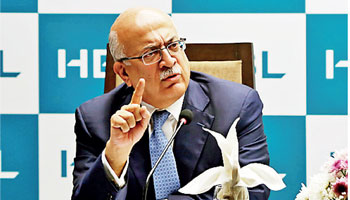Wednesday Feb 18, 2026
Wednesday Feb 18, 2026
Thursday, 31 August 2017 00:00 - - {{hitsCtrl.values.hits}}
 Karachi, Pakistan (Reuters): Pakistan’s largest bank, facing a possible $ 630 million fine over compliance failures by its New York branch, admitted mistakes on Tuesday but denied any wrongdoing and said the penalty sought by US regulators was disproportionate.
Karachi, Pakistan (Reuters): Pakistan’s largest bank, facing a possible $ 630 million fine over compliance failures by its New York branch, admitted mistakes on Tuesday but denied any wrongdoing and said the penalty sought by US regulators was disproportionate.
New York State’s Department of Financial Services (DFS) said on Monday it was seeking to fine Habib Bank Ltd (HBL) up to $ 630 million for “grave” compliance failures with anti-money laundering rules, in what would be the largest penalty ever faced by a Pakistani financial institution.
“There is no specific wrongdoing,” HBL Chief Executive Noman Karamat Dar told a press briefing in Islamabad. “Yes there are mistakes, but we are saying that the fine for these mistakes is disproportionate.”
HBL, which has announced it plans to surrender its US banking licence, has been embroiled in accusations over money-laundering compliance failures by its New York operation for more than a decade.
But the case has gained added weight amid growing political tensions between Washington and Islamabad following US President Donald Trump’s demand last week that Pakistan do more to cut off sanctuaries for Afghan Taliban insurgents.
The DFS, which has pursued several aggressive enforcement actions against foreign banks, has said HBL’s compliance systems were “dangerously weak” and “serious and persistent failings” at its New York unit appeared to affect the entire enterprise.
It singled out HBL’s connections with Saudi Arabia’s largest private bank Al Rahji, which has been linked by the US Senate and in the media to Al Qaeda and the financing of extremism.
It has also identified instances of so-called “wire-stripping”, whereby a bank deliberately strips out information related to a payment, such as the originator or beneficiary, that may raise suspicions.
Dar admitted that the bank had made a mistake in not identifying some transactions but attributed it to human error.
The bank has said operations outside the United States would not be affected and it would contest any fine. Dar said whatever happened, there would be no long-term effect.
“Our liquidity, profitability and strength is enough to take the bank forward,” he said.
Until April 2015, Pakistan’s government held a 42.5% stake in HBL, the country’s oldest bank. But it sold its shares as part of a privatisation drive, bringing in more than $ 1 billion. The DFS, however, still lists HBL as majority owned by the government.